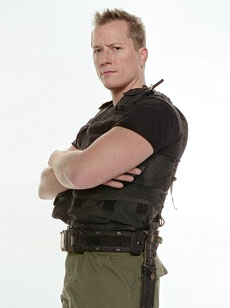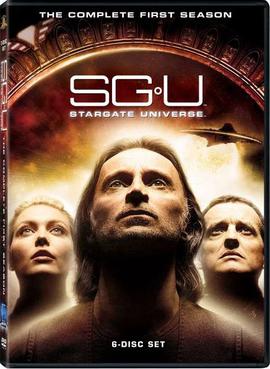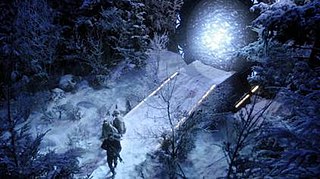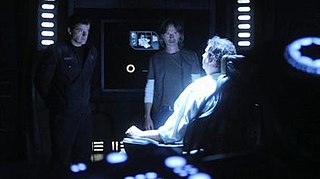
Jonathan J. "Jack" O'Neill is a fictional character in the MGM's military science fiction franchise Stargate, primarily as one of the main characters of the television series Stargate SG-1. Richard Dean Anderson played O'Neill in all the Stargate media since 1997, when he took over the role from actor Kurt Russell, who portrayed the character in the original Stargate film in 1994. O'Neill and Daniel Jackson are the only two characters to appear in both the original film and all three live-action Stargate television series.

Daniel Jackson, PhD, is a fictional character in the military science fiction franchise Stargate, and one of the main characters of the 1997 series Stargate SG-1. He is portrayed by James Spader in the 1994 film Stargate, and by Michael Shanks in Stargate SG-1 and other SG-1 derived media. Jackson is the only Stargate character to appear in all films and series in the franchise.

A Stargate is a fictional Einstein–Rosen bridge portal device within the Stargate fictional universe that allows practical, rapid travel between two distant locations. The devices first appeared in the 1994 Roland Emmerich film Stargate, and thereafter in the television series Stargate SG-1, Stargate Atlantis, and Stargate Universe. In these productions, the Stargate functions as a plot device, allowing the main characters to visit alien planets without the need for spaceships or any other type of technology. The device allows for near-instantaneous travel across both interstellar and extragalactic distances.
Stargate is a military science fiction media franchise based on the film directed by Roland Emmerich, which he co-wrote with producer Dean Devlin. The franchise is based on the idea of an alien wormhole device that enables nearly instantaneous travel across the cosmos. The franchise began with the film Stargate, released on October 28, 1994, by Metro-Goldwyn-Mayer and Carolco, which grossed US$197 million worldwide. In 1997, Brad Wright and Jonathan Glassner created a television series titled Stargate SG-1 as a sequel to the film. This show was joined by Stargate Atlantis in 2004, Stargate Universe in 2009, and a prequel web series, Stargate Origins, in 2018. Also consistent with the same story are a variety of books, video games and comic books, as well as the direct-to-DVD movies Stargate: Children of the Gods, Stargate: The Ark of Truth, and Stargate: Continuum, which concluded the first television show after 10 seasons.

Jonas Quinn is a fictional character in the Canadian-American television series Stargate SG-1, a science fiction show about a military team exploring the galaxy via a network of alien transportation devices. Played by Corin Nemec, Jonas is introduced in the season 5 episode "Meridian." Jonas fills Daniel Jackson's empty spot on the SG-1 team in season 6 and the beginning of season 7, and last appears in the mid-season 7 episode "Fallout".

Robert C. Cooper is a Canadian writer and producer best known for his work in the Stargate franchise. He was formerly an executive producer of Stargate SG-1, Stargate Atlantis and Stargate Universe. He also co-created both Stargate Atlantis and Stargate Universe with Brad Wright. Cooper has written and produced many episodes of Stargate SG-1, Stargate Atlantis and Stargate Universe as well as directed a number of episodes.

Stargate Universe is a military science fiction drama television series and part of MGM's Stargate franchise. It follows the adventures of a present-day, multinational exploration team traveling on the Ancient spaceship Destiny several billion light years distant from the Milky Way Galaxy. They are now trying to figure out a way to return to Earth, while simultaneously trying to explore and to survive in their unknown area of the universe. The series, created by Brad Wright and Robert C. Cooper, premiered in the United States on Syfy on October 2, 2009. The series featured an ensemble cast and was primarily filmed in and around Vancouver, British Columbia, Canada. A second season of 20 episodes was announced by Syfy in December 2009.

First Lieutenant Matthew Scott, USAF is a fictional character from the 2010 science fiction television series, Stargate Universe, the third live-action series in the Stargate franchise, which centers on a group of soldiers and civilians trapped on the Ancient vessel Destiny. He is portrayed by Brian J. Smith. Matthew Scott holds the rank of First Lieutenant, and is described as a skilled and well-trained junior SGC member in his twenties, but is "mentally unprepared for the urgency of the situation" aboard the Destiny.

The first season of Stargate Universe consists of 20 episodes. Brad Wright and Robert C. Cooper wrote the three-part series opener named "Air", which was originally planned to be a two-parter. The first two parts of "Air" premiered on Syfy on October 2, 2009, with regularly weekly airing beginning on October 9, 2009. "Fire" was originally going to be the title for episode four, but the story and script was too big to be able to fit into one episode, so the producers changed it to become a two-parter called "Darkness" and "Light", therefore pushing all future episodes forward one slot. "Justice" was the mid-season finale. The back half of the first season aired on Friday April 2, 2010 on Space and Syfy.
"Air" is the three-part opening episode of the military science fiction television series Stargate Universe. The first two parts aired on Syfy in the United States on October 2, 2009, while the third part aired on October 9. In Canada, SPACE aired the first two in tandem with Syfy. Sky1 broadcast the first two parts on October 6, and the third on October 13, whilst Sci Fi Australia aired the two-parter on October 9, and the third part on October 16. "Air" was written by series creators Robert C. Cooper and Brad Wright, and was directed by Andy Mikita.
"Darkness" is the fourth episode of military science fiction television series Stargate Universe, and is the first part of a two-part story. The episode originally aired on October 16, 2009 on Syfy in the United States, followed by being aired in the United Kingdom and Ireland on October 20. The episode was directed by Peter DeLuise, who had previously directed episodes of both Stargate SG-1 and Stargate Atlantis. However, he had not worked on the Stargate franchise for the previous two years. The episode was written by Brad Wright who co-wrote the pilot episode.

"Faith" is the thirteenth episode of military science fiction television series Stargate Universe. The episode originally aired on April 16, 2010 on Syfy in the United States, and on SPACE in Canada. The episode was directed by William Waring who directed two other episodes for the series. The episode was written by Denis McGrath, and this episode represents his first foray into the Stargate franchise.

"Human" is the fourteenth episode of military science fiction television series Stargate Universe. The episode originally aired on April 23, 2010 on Syfy in the United States, and on SPACE in Canada. The episode was directed by series creator, Robert C. Cooper and was written by Jeff Vlaming. The episode focuses on Dr. Rush working on modifying the chair interface, so that he can use it in an attempt to gain access to the master code while replaying the memories during his wife's dying days. The episode was viewed by 1.3 million Americans and was generally well received.

"Lost" is the fifteenth episode of military science fiction television series Stargate Universe. The episode originally aired on April 30, 2010 on Syfy in the United States, and on SPACE in Canada. The episode was directed by, Rohn Schmidt who previously acted as the director of photography in Air. It was written by Martin Gero, a co-executive producer of Stargate Atlantis.

"Sabotage" is the sixteenth episode of military science fiction television series Stargate Universe. The episode originally aired on May 7, 2010 on Syfy in the United States, and on SPACE in Canada. The episode was directed by, Peter DeLuise who previously directed the two episode arc, Darkness and Light. It was written by Barbara Marshall.

The second and final season of Stargate Universe was announced by Syfy on December 13, 2009. Like the first season, the second season consisted of 20 episodes. The series was moved from the franchise's long history of Friday to Tuesday, along with Caprica, as Syfy had picked up WWE Friday Night SmackDown. The series resumed on September 28, 2009, USA. In Ireland & UK, the series resumed on October 5 at 9pm on Sky1 and Sky1 HD.

"Blockade" is the nineteenth and penultimate episode of the second season of the military science fiction television series Stargate Universe. The episode originally aired on May 2, 2011 on Syfy in the United States. The episode was directed by longtime director and producer of the Stargate franchise Andy Mikita. It was written by Linda McGibney.

"Gauntlet" is the twentieth episode of the second season and series finale of the military science fiction television series Stargate Universe. The episode originally aired on May 9, 2011 on Syfy in the United States. The episode was directed by longtime director and producer of the Stargate franchise Andy Mikita. It was written by executive producers Joseph Mallozzi and Paul Mullie.















